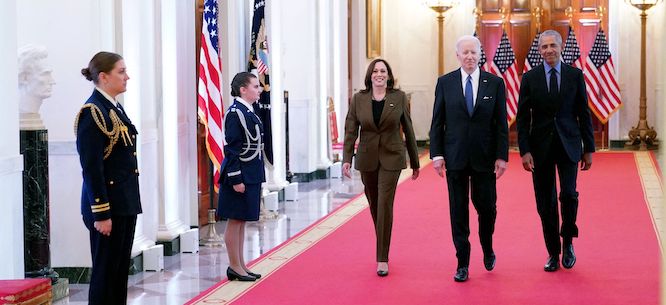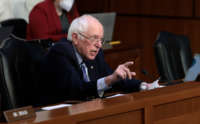The Senate Budget Committee will hold a hearing on Thursday to examine the economic and social benefits of implementing Medicare for All to combat the current health care crisis, Chairman Sen. Bernie Sanders (I-Vermont) announced on Monday.
The COVID pandemic, which has claimed over 1 million lives in the U.S. so far, has highlighted the inequities in the U.S. health care system — which were already vast before the pandemic, Sanders wrote in a press release. The senator’s plea, which he has been making for years, is a familiar one: now, more than ever, the U.S. must catch up to every other wealthy country in the world and implement universal health care.
“Estimates show that nearly 27 million Americans and their families lost their health care coverage when they lost their jobs due to COVID-19,” Sanders said in a tweet on Tuesday. “Let me be clear: health care is a human right, not a job benefit. Yes. It’s time for Medicare for All.”
The hearing, entitled “Medicare for All: Protecting Health, Saving Lives, Saving Money,” will feature testimony from health and policy experts, as well as testimony from the director of the Congressional Budget Office (CBO), which has previously analyzed how a single-payer health care system would impact the U.S. budget.
As Sanders pointed out, the U.S. spends twice as much per capita on health care as the average wealthy country, but has the lowest life expectancy and fewer physician visits than in most other wealthy countries, according to The Commonwealth Fund. Over a quarter of the entire U.S. adult population is not insured or is underinsured because of the country’s highly exclusive private health care system; as a result, tens of thousands of Americans die each year because they either put off or don’t seek medical care when they need it, the press release says.
These inequities have been made starker by the pandemic. As tens of millions of families lost health insurance due to pandemic-related layoffs, unequal access to health insurance created large disparities in health outcomes between people who are insured and people who are uninsured.
Implementing Medicare for All would be immensely beneficial for health outcomes and equity in the U.S., the press release goes on — and it would also come with economic benefits.
“[E]stimates show that Medicare for All could save 68,000 lives per year, and numerous studies find that Medicare for All saves the American people and the U.S. health care system billions of dollars a year,” the press release says.
“According to the Congressional Budget Office, Medicare for All would save $650 billion each year, improve the economy, and eliminate all out-of-pocket health care costs,” the press release continues. “Even a study done by the right-wing Mercatus Center estimated that Medicare for All would save more than $2 trillion over a decade.”
In March, Sanders vowed that he would soon reintroduce his Medicare for All bill, which he has reintroduced several times over the past decade or so.
Lawmakers in the House have also been advocating for the proposal, and progressive representatives held the first pandemic-era hearing on the topic in March. Earlier this year, Rep. Pramila Jayapal’s (D-Washington) version of the bill gained a record 121 cosponsors in the House — far short of the roughly 218 votes needed to pass the House, but a sign that the idea is gaining momentum among the Democratic caucus.
The measure is popular among the public. According to a poll from Morning Consult/Politico last year, 55 percent of Americans support Medicare for All, while only 32 percent oppose it; a poll in 2020 by The Hill/HarrisX found that 69 percent of voters support Medicare for All.
This post was originally published on Latest – Truthout.






